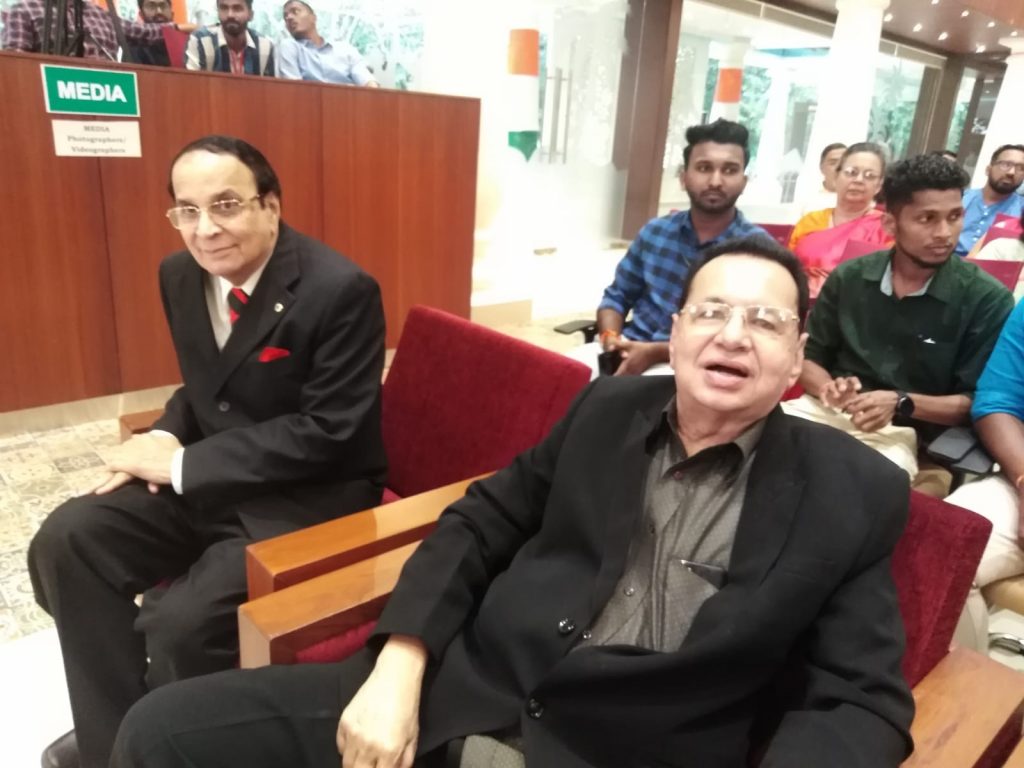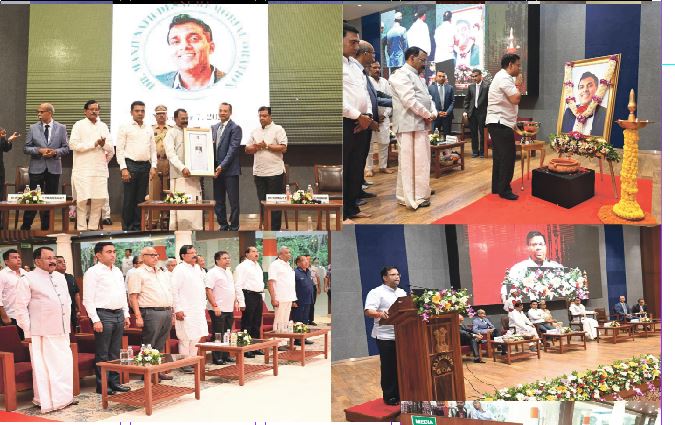At the Dr Manjunath Desai memorial oration committee function at the Darbar Hall, RaJ Bhavan…Everyone was united in praise of ‘a doctor with a difference.’ There was a large fraternity of politicans and doctors present at the function on Monday, November 7, 2022. The distinguished orator who gave the keynote talk was Dr Theodore P Abraham from the USA.
IT was one of those emotional moments in the fitness of things to remember. And many remembered the late cardiologist Dr Manjunath Desai who laid the ground work in setting up the Department of Cardiovascular & Thoracic at the GMC from 2013, so that Goans who suffer heart attacks may get timely treatment and countless lives could be saved. Many are the patients and colleagues who remember the slight but energetic Dr Manjunath. He had joined Goa’s premier public hospital, the Goa Medical College & Hospital and soon after worked around the clock to help establish today’s state-of-the-art department which now has a top notch team of cardiologists.
Reportedly, Dr Manjunath Desai himself performed around 10,000 surgeries in the cardiology department of the GMC. Alas, the good doctor passed away tragically prematurely in October last year much to the shock of his many admirers (I understand he was suffering from a blood cancer for some time but valiantly went about his duties at the GMC). Now in the memory of his sterling efforts in the field of cardiology in Goa, Chief Minister Pramod Sawant, while speaking at the first ever Dr Manjunath Desai Memorial Oration at the Durbar Hall of the Raj Bhavan on Monday, November 7, 2022 announced that a special cardiac unit will be named as the Dr Manjunath Desai cardiac unit at the GMC henceforth. Present in the audience was his wife Poonam Desai and son.

IT WAS a fraternity of doctors to appreciate at the function. Visiting Dr Theodore P Abraham (alumnus of GMC), now based at the University of California as Professor of Medicine & Clinical Chief of Cardiology, Dr Theodore P Abraham, gave a very interesting first oration, accompanied with a documentary presentation on “Hypertrophic Cardiomyopathy” sportspersons and those in energetic professions as in the army and police force may suffer in the prime of their life. Dr Theodore is a specialist in the genetic basis of cardiomyopathy and his presentation starkly brought home the importance of timely intervention when it comes to matters of the heart.
Most of us think that cardiology is only about heart attacks but it is far, far more and branches out into several kinds of heart diseases and problems. The human heart is a far more interesting and fascinating vital organ of body beautiful than we think! Most of us only think heart attacks are a topmost killer the world over. Remember that heart attacks are often described as “silent killers” and may hit you without warning or at least warnings and symptoms we choose to ignore…do you know that nausea, shortness of breath, cold sweat and dizziness may be symptoms of a heart in trouble and in urgent need of treatment?
There are also the various heart diseases which fester and we don’t pay attention too until there is a sudden loss of heart function….needless to say heart care has come a long, long way today and is a complete speciality on its own including heart transplants and much more. When it comes to dealing with the heart the key players are in multi-disciplinary teams and I must note that I have been reading about the National Heart Centre in Singapore which repeatedly gets awarded for being one of the best cardiology centres in the world – but then Singapore is a wealthy country!
TO stay with our own GMC team, the idea of paying a tribute to the late Dr Manjunath Desai with an invitee oration and citation, came from Dr Shirish Borkar (professor and HOD of Cardiology & Thoracic Surgery), Dr Guruprasad Naik (chief interventional cardiologist) who did the honors of listing Dr Manjunath’s achievements at the function, there is also Dr Virendra Gaonkar (senior consultant, neonatologist and paediatrist), Dr Amar Prabhudesai and others of the GMC’s cardiology department.
Altogether it was a meeting of political and medical sensibilities like no other present at the memorial function were Governor P S Sreedharan Pillai was full of praise for Dr Manjunath’s work and described him as a “doctor with a difference”; Chief Minister Dr Pramod Sawant; Union Minister of State Shripad Naik, Health Minister Vishwajit Rane and wife who’s MLA of Poriem constituency Deviya Rane , Agriculture Minister Ravi Naik, Power Minister Ramakrishna Dhavalikar…there were a few industrialists Shrinivas Dempo, Shrinivas Salgaocar, and amongst the older generation of doctors were my favourite Dr Francisco Colaco and Dr Sidney Pinto Rosario; there was Dr Mahendra Kudchodkar, Dr Shekar Salkar and many other familiar faces. A rather long documentary was screened of Dr Manjunath’s life as a dedicated cardiologist, the script written by Dr Oscar Rebello.
Dr Theodore Abraham was chief guest of course and later on while saying hello to him, I confided that I had stopped taking my ecosprin and statin and he said I better take them. Or instead of living for 20 years more it may all end in ten years or so. With the heart one can never tell, don’t fool with it. That left me a little flabbergasted and worried with something to think about much later.
In the audience were maybe from 1,000 plus, plus consultant and resident doctors of the GMC and Goa, it was a largely invitee audience which was later treated to a high tea of rather tempting junk food! Well, the pao-bhaji was not too buttery mercifully and I am sure even doctors enjoy cocktail samosa and gulab jamun, there were nice sandwiches. Queues were long and I skipped the gulab jamun but tasted some of the pao-bhaji, washed down with sweet, hot coffee. Amonkar’s did the catering.
On that note it’s avjo, selamat datang, poite verem, au revoir, arrivedecci and vachun yeta here for now!
—Mme Butterfly
Some things about the heart you might want to know…
DO you know that blood pressure readings serve as an important indication of one’s risk of severe health conditions such as a stroke or heart attack? If you are suffering from high blood pressure it is a good practice to do home blood pressure monitoring to ensure that your blood pressure is always under control. Important tips to remember before taking your blood pressure: Rest for five to 10 minutes, or wait 30 minutes if you have exercised, smoked, eaten a heavy meal or consumed caffeine, emptied your bladder.
Abnormal rhythms, even brief rhythm disorders, can be picked up with a Holter monitoring test, where the patient wears a special recorder and ECG is continuously monitored for 24 to 48 hours. Doctors recommend the test for patients with palpitations, giddiness or fainting spells, and those with possible coronary artery disease but not able to perform an exercise stress test.
Do you know that the average waiting time for patients to receive heart transplants is about 38 months? The number of heart donors in Singapore has steadily increased over the years but suitable donor hearts for transplantations have been few and far between. Their National Organ Transplant Unit (NOTU), Ministry of Health, organises the Live On Festival annually to raise awareness on the importance of organ donation and encourage participants (in particular, youth) to donate their organs.
They run programs on managing atrial fibrillation (AF), medication and lifestyle changes like adopting physical activities, eating a healthy diet and controlling cholesterol so that your HPL is better than your LPD. Balance and strength training can help improve the body’s sensory, cognitive and musculoskeletal systems to reduce the risk of falls.
Prof Stuart Cook from Duke-NUS Medical School and NHCS winning team Cure Heat has done ground breaking research in cardiovascular medicine for global British Heart Foundation. His research from Singapore has advanced understanding of the genetic basis of cardiomyopathy and cellular processes underlying myocardial disease.
What is the most common cause of cardiomyopathy? Coronary artery disease or heart attack. It can also be caused by genetic changes. Hypertrophic cardiomyopathy involves the abnormal thickening of the heart muscle, which makes it harder for the heart to work. Take stock of four signs –shortness of breath or trouble breathing especially with physical exertion, fatigue, swelling in the ankles, feet, legs, abdomen and veins in the neck, dizziness. It is a serious condition, progressive (meaning it usually worsens over time) and life threatening – get it treated.
One study showed that people with heart failure have a life span of 10 years shorter than those who don’t have heart failure. Another study showed that the survival rates of people with chronic heart failure were 80% to 90% for one year, but that dropped to 50% to 60% for year five and down to 30% for 10 years (Jan 21, 2022 studies).
There is also something called stress cardiomyopathy, a condition caused by intense emotional or physical stress leading to rapid and severe reversible cardiac dysfunction. It mimics myocardial infarction with changes in the electrocardiogram and echocardiogram, but without any obstructive coronary artery disease. Hypertrophic cardiomyopathy as Dr Theodore Abraham pointed out is the most common inherited or genetic heart disease to do with hardening of the heart which is a muscle and a pump organ.
Chest X-ray, an image of the heart will show whether it’s enlarged. Echocardiogram uses sound waves to create images of the heart, which show its size and its motions as it beats. Electrocardiogram (ECG, treadmill stress test, cardiac catheterization, cardiac MRI, cardiac CT scan, blood tests, etc.
Interestingly, viral infections in the heart are a major cause of cardiomyopathy. In some cases, another disease or its treatment causes cardiomyopathy. This might include complex congenital (present at birth) heart disease, nutritional deficiencies, uncontrollable, fast heart rhythms, or certain types of chemotherapy for cancer. Blood tests check the levels of certain substances in your blood that are raised when you have cardiomyopathy or complications such as heart failure. Heart tests, such as imaging tests, echocardiography, and stress tests, check the size and shape of your heart and how well it is working.
Heart failure can occur when the heart muscle is weak (systolic failure) or when it is stiff and unable to relax normally (diastolic failure). Cardiomyopathy means “disease of the heart muscle” and it is one of the many causes of heart failure. Avoid cardiomyopathy by not smoking or using tobacco, get moving with at least 30 to 60 minutes of activity daily, eat a heart healthy diet, maintain a healthy weight, get good quality sleep, manage stress.
Patients with end-state cardiomyopathy have stage D heart failure or severe symptoms at rest refractory to standard medical therapy. System(s) affected: cardiovascular, renal. Reports have described various cardiovascular complications from Covid-19 infection, including acute myocardial infarction, myocarditis, cardiomyopathy, arrhythmia and venous thromboembolism.
So the long and short of all this is – respect your heart and don’t have a cavalier attitude towards it.
